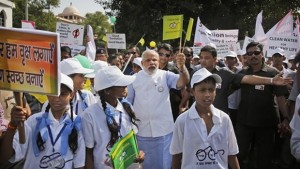
New Delhi, Prime Minister Narendra Modi joined millions of schoolchildren, officials and ordinary people who picked up brooms and dustpans Thursday in a countrywide campaign to clean parks, public buildings and streets.
Prime Minister Narendra Modi swept the road in a poor neighborhood in New Delhi while launching the Clean India Campaign. Elsewhere in state capitals and small towns, lawmakers, school principals, factory workers and millions of common folk swept and cleared garbage, and cleaned ditches and parks.
Modi chose the birth anniversary of independence leader Mohandas K. Gandhi to launch the five-year drive to clean public spaces in a bid to change India’s image as one of the filthiest countries in the world.
Modi, who has made cleanliness and hygiene a major plank of his speeches since taking office in May, led thousands of New Delhi residents on a walk through newly cleaned roads in the heart of the city.
“We can’t let India remain unclean any longer,” Modi said in a public appeal earlier this week.
The campaign was preceded by a media blitz exhorting Indians to take a pledge to tidy up their homes and offices. Newspapers carried advertisements while television channels broadcast messages to create awareness about the sanitation and hygiene campaign.
Although Oct. 2 is usually a public holiday, Modi ordered officials in India’s massive bureaucracy and schoolchildren from all the city schools to turn up and take the pledge to clean their offices, school premises and streets.
The impact was evident, with people across the country coming out in droves, armed with trash cans, rakes and brooms to take part.
Cabinet ministers, police and industry leaders have been clearing files and getting rid of clutter in their offices.
The campaign ties in with a government plan to build public toilets and end the practice of open defecation — a major challenge in a country where more than half of the country’s 1.2 billion people do not have access to toilets. The plan is estimated to cost 620 billion rupees ($10.1 billion), with a major chunk of the funds coming from businesses and aid agencies.
“If we can all come together and make this a people’s movement, then I think that we can have our name among the cleanest cities and countries of the world,” Modi told schoolchildren and officials while launching the mission.
On Thursday officials and schoolchildren had to take a pledge to spend 100 hours a year cleaning their surroundings.
Government offices, especially, are notorious for their filthy state. Dusty files and dirty corridors are often breeding grounds for rats, cockroaches and other pests. In Modi’s first month in office, he ordered all ministries to cull ceiling-high piles of old files, saving only the most important for reference or their historic value.
Many in India felt the cleanliness drive was long overdue.
“You walk into any government office and the filth is shocking,” said Amitabha Pande, a retired bureaucrat. “Some may dismiss the campaign saying it’s a symbolic ritual. But even as a symbolic gesture, it carries a lot of significance,” Pande said.
In the last decade, along with India’s economic boom and increasing prosperity, the output of garbage has increased manifold. However, few cities have waste management systems in place to deal with the tons of refuse that are produced each day and discarded, often on the streets.




 Driving Naari Programme launched in Chandigarh
Driving Naari Programme launched in Chandigarh






























